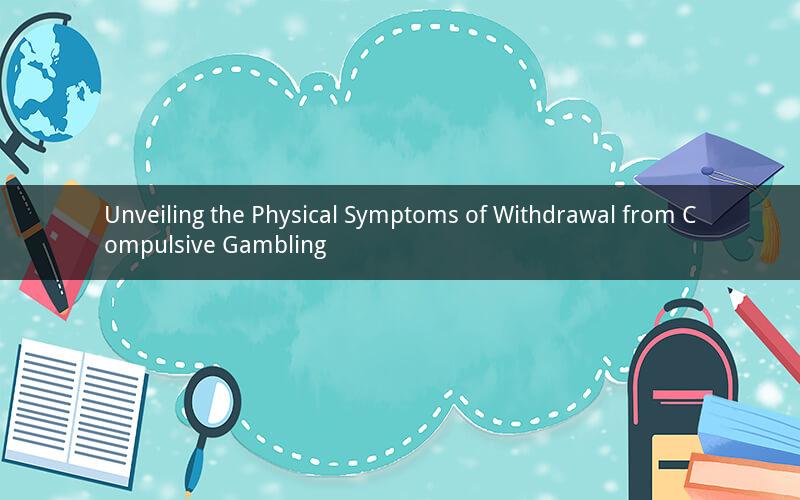
Compulsive gambling, often referred to as gambling addiction, is a significant issue affecting millions of individuals worldwide. This addictive behavior can lead to severe consequences, both emotionally and physically. One of the most critical aspects of understanding compulsive gambling is recognizing the physical symptoms of withdrawal. In this article, we will delve into the various physical symptoms experienced by individuals suffering from withdrawal from compulsive gambling.
1. Insomnia and Sleep Disturbances
One of the most common physical symptoms of withdrawal from compulsive gambling is insomnia and sleep disturbances. Many individuals with gambling addiction find it challenging to fall asleep or stay asleep throughout the night. This can be attributed to the stress and anxiety caused by the addictive behavior. The constant worry about finances, relationships, and the urge to gamble can disrupt sleep patterns, leading to chronic insomnia.
2. Nausea and Digestive Issues
The physical symptoms of withdrawal from compulsive gambling can also manifest as nausea and digestive issues. The stress and anxiety associated with gambling addiction can lead to an imbalance in the digestive system, causing discomfort, bloating, and nausea. In some cases, individuals may experience acid reflux, irritable bowel syndrome (IBS), or other gastrointestinal disorders.
3. Headaches and Migraines
Another common physical symptom of withdrawal from compulsive gambling is headaches and migraines. The constant stress and anxiety can trigger tension headaches or migraines, making it difficult for individuals to concentrate or carry out daily tasks. These headaches may be severe and can last for several days, significantly impacting the individual's quality of life.
4. Increased Heart Rate and Blood Pressure
Compulsive gambling can lead to increased heart rate and blood pressure, which can exacerbate withdrawal symptoms. The stress and anxiety associated with the addictive behavior can cause the body to release adrenaline, leading to an elevated heart rate and blood pressure. This can be particularly dangerous for individuals with pre-existing heart conditions or hypertension.
5. Muscle Tension and Tremors
Muscle tension and tremors are also common physical symptoms of withdrawal from compulsive gambling. The constant stress and anxiety can cause the muscles to become tense, leading to discomfort and pain. In some cases, individuals may experience hand tremors, which can be particularly noticeable when writing or performing fine motor tasks.
6. Fatigue and Loss of Energy
Individuals suffering from withdrawal from compulsive gambling often experience fatigue and a loss of energy. The stress and anxiety associated with the addictive behavior can drain the body's energy reserves, making it difficult to carry out daily activities. This fatigue can be severe, leading to decreased productivity and social withdrawal.
7. Weight Fluctuations
Weight fluctuations are another physical symptom of withdrawal from compulsive gambling. The stress and anxiety associated with the addictive behavior can lead to changes in appetite, causing individuals to either overeat or lose their appetite altogether. This can result in rapid weight gain or loss, which can further impact the individual's overall health.
8. Hair Loss and Skin Problems
Compulsive gambling can also lead to hair loss and skin problems. The stress and anxiety associated with the addictive behavior can weaken the hair follicles, leading to hair loss. Additionally, individuals may experience skin issues such as acne, eczema, or psoriasis due to the stress and poor dietary habits.
9. Impaired Immune System
The physical symptoms of withdrawal from compulsive gambling can also impact the immune system, making individuals more susceptible to infections and illnesses. The stress and anxiety associated with the addictive behavior can weaken the immune system, leading to frequent colds, flu, and other infections.
10. Heartburn and Gastroesophageal Reflux Disease (GERD)
Heartburn and GERD are additional physical symptoms of withdrawal from compulsive gambling. The stress and anxiety associated with the addictive behavior can trigger acid reflux, causing heartburn and discomfort. In some cases, individuals may develop GERD, a chronic condition that requires medical intervention.
In conclusion, the physical symptoms of withdrawal from compulsive gambling can be quite severe and vary from person to person. It is crucial for individuals suffering from gambling addiction to seek professional help to address these symptoms and overcome their addiction. By understanding the physical symptoms of withdrawal, individuals can take the necessary steps to improve their overall health and well-being.
Questions and Answers:
1. What are the primary physical symptoms of withdrawal from compulsive gambling?
Answer: The primary physical symptoms of withdrawal from compulsive gambling include insomnia and sleep disturbances, nausea and digestive issues, headaches and migraines, increased heart rate and blood pressure, muscle tension and tremors, fatigue and loss of energy, weight fluctuations, hair loss and skin problems, impaired immune system, and heartburn and GERD.
2. How long do the physical symptoms of withdrawal from compulsive gambling last?
Answer: The duration of physical symptoms can vary from person to person. Some individuals may experience symptoms for a few days, while others may struggle with them for several weeks or months.
3. Can the physical symptoms of withdrawal from compulsive gambling be severe?
Answer: Yes, the physical symptoms of withdrawal from compulsive gambling can be quite severe, impacting an individual's quality of life and overall health.
4. Are there any medications available to alleviate the physical symptoms of withdrawal from compulsive gambling?
Answer: While there are no specific medications designed to alleviate the physical symptoms of withdrawal from compulsive gambling, certain medications may be prescribed to manage specific symptoms, such as anxiety or depression.
5. Can therapy help with the physical symptoms of withdrawal from compulsive gambling?
Answer: Yes, therapy can be beneficial in addressing the physical symptoms of withdrawal from compulsive gambling. Counseling and support groups can help individuals cope with the emotional and psychological aspects of addiction, which can, in turn, alleviate some of the physical symptoms.